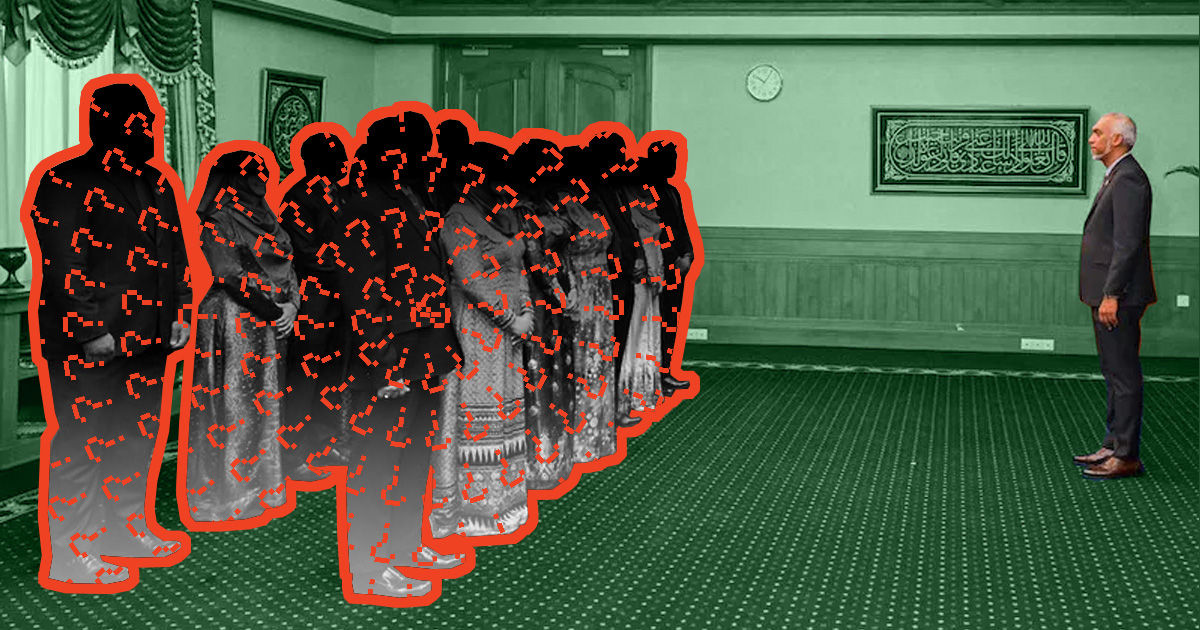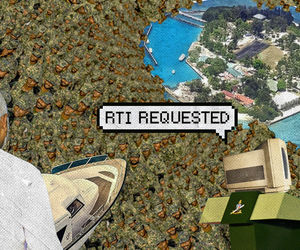Government relents on disclosing number of political appointees
But details of 228 political staff dismissed last year were withheld.

Artwork: Dosain
12 Feb 2025, 10:30
The government has relented on revealing the number of political appointees, 15 months after President Dr Mohamed Muizzu took office with promises of unprecedented transparency and information disclosure.
Attorney General Ahmed Usham announced on Monday night that the state had withdrawn an appeal filed against an order to comply with a right to information request.
"The President's Office will provide the information to the requesting party in accordance with the Information Commissioner's decision,” Usham tweeted.
The RTI request from a private citizen sought details about individual appointed to political posts between November 18, 2023 and January 8, 2024, including their names (excluding addresses), renumeration and posts. But the President’s Office initially refused to comply on the grounds that it was private information.
When a complaint was made to the Information Commissioner's Office, the commissioner ruled in September that the information must be disclosed in the public interest as defined in the Right to Information Act.
But the government challenged the order in the High Court on February 2. According to Usham, the Attorney General’s Office requested withdrawal of the appeal on February 3.
“It’s positive news that government has decided to abide by our ruling,” Information Commissioner Ahid Rasheed told the Maldives Independent.
“If the government decided not to pursue this in the courts that probably means the government will provide information on all those similar requests for information. That’s my hope.”
Cherry-picking compliance
But the government has not reversed its stance in refusing to disclose the identities of 228 political appointees who had purportedly been dismissed in October.
Following Muizzu’s announcement of the dismissals, Afrah Ismail, a private citizen, together with journalists from Mihaaru and Sun, filed RTI requests for information about the sacked appointees.
The government refused to comply with the same contention that it was private information concerning third parties. However, the ICOM ruled on December 25 that the information must be disclosed after redacting addresses.
"We decided to appeal the case of the 228 dismissed political appointees because there were conflicts with previous Supreme Court and High Court rulings,” Ahmed Fazeel, public relations director at the Attorney General's Office, told the Maldives Independent, confirming that the appeal has not been withdrawn.
Fazeel said the ICOM’s interpretation conflicts with legal precedents concerning the RTI law’s provisions on “private information” and "prioritising public interest”.
But the government “cannot cherry pick” what information to withhold or disclose, said Azza Mohamed, governance manager at Transparency Maldives. However, the anti-corruption NGO welcomes the decision to reveal the number of political appointees as a step in the right direction, she told the Maldives Independent.
Without disclosing identities or other details, the government previously revealed the dismissal of seven state ministers, 43 deputy ministers, 109 senior political directors, and 69 political directors as a cost-cutting measure.
"Even though the Attorney General mentioned withdrawing the appeal in another case about political appointees' information, unless they actually provide the information, it would be hard to believe anything,” Afrah, the private citizen who filed the RTI for the dismissed appointees, told the Maldives Independent, urging the government to reconsider the challenge.
Information disclosure should be regular and institutionalised and “shouldn’t be disclosed differently for different cases, in bits and pieces, having to beg for it," Afrah said.
The failure to disclose “even the basic information about which ministries the dismissed employees belonged to, their positions, and salaries” creates doubt about the claim of 228 dismissals, Afrah added.
In January this year, Afrah won an RTI case against the state. The Supreme Court overruled the previous government’s refusal to provide plans and details about the development of Ameenee Magu as requested on August 31, 2022.
The apex court judgment criticised the government’s various pretexts at different stages to withhold information.
"Presenting different reasons for withholding information at each stage is like throwing fishing lines from different parts of a river bank hoping to catch a fish," Justice Aishath Shujoon wrote in the majority opinion.
Rationale for reversal
The Attorney General’s announcement prompted questions on social media about the government’s legal challenges to withhold information.
"Were there really no valid reasons for the appeal?" former Prosecutor General Ahmed Muizz asked on X.
"The withdrawal of the appeal is good – but why did they waste time and resources going to higher courts to withhold information that should have been provided directly? Why wasn't it disclosed all this time?" said Imthiyaz Fahmy, president of the opposition Democrats.
The formerly ruling Maldivian Democratic Party government’s track record on information disclosure had been similarly patchy, particular when president Ibrahim Mohamed Solih sought re-election in September 2023.
On Press Freedom Day earlier that year, Information Commissioner Ahid expressed concern over growing complaints about the refusal to comply with RTI requests. The number of cases filed with ICOM against the the Solih administration’s withholding of information since 2022 exceeded the total number of cases from the previous seven years combined, Ahid revealed.
During his rise to power, then-opposition candidate Muizzu repeatedly lambasted the secrecy. In particular, the opposition criticised the MDP government’s appeal to the High Court to withhold details about Solih’s 2021 trip to New York to address the UN General Assembly.
In his campaign, Muizzu pledged to limit the number of political staff to no more than 700, accusing Solih of presiding over a top-heavy government with 1,400 political staff.
However, the number of political staff under the current administration was close to 2,000.
Shortly after assuming office on November 17, 2023, Muizzu assured journalists that RTI requests would not be necessary. "All information will be available. Nothing will be withheld,” he pledged, adding that the public would not need to “beg” either by submitting forms to seek information.
In June last year, Heena Waleed, the president’s spokeswoman, announced that the government was drafting amendments to the RTI Act "to bring necessary reforms to implement the law in a democratic environment." Attorney General Usham assured at the time that these amendments would not make it harder to obtain information. A draft of this bill has yet to be made public.
Discussion
No comments yet. Be the first to share your thoughts!
No comments yet. Be the first to join the conversation!
Join the Conversation
Sign in to share your thoughts under an alias and take part in the discussion. Independent journalism thrives on open, respectful debate — your voice matters.




